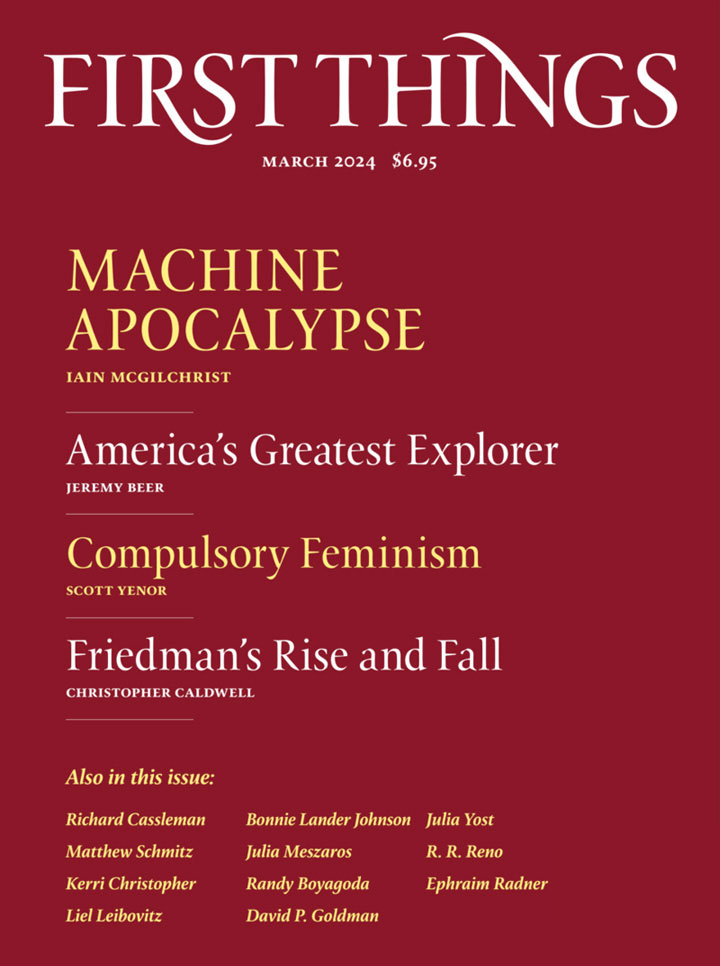In certain corners of the internet, a new form of anti-feminism is gaining currency. Rather than extol family values, it questions the institution of marriage. Instead of hymning heterosexual love, it glorifies male camaraderie. Far from opposing assisted reproductive technologies, it hopes that they will one day render women superfluous. It envisions a world in which men, unencumbered by women, will be free to court risk, seek pleasure, and attain glory.
The people who express this anti-feminism are politically marginal, their arguments often inchoate. But they have revived a strain of thinking that has had eloquent exponents in earlier generations and deserves to be taken seriously today. For as marriage declines and political polarization between the sexes increases, the appeal of anti-family anti-feminism will only grow.
One online cohort in which these arguments have traction is that of influencers who promote “Men Going Their Own Way,” or #MGTOW. “Marriage, in essence, is a man choosing his slave master,” says Turd Flinging Monkey, an #MGTOW influencer with more than 80,000 followers on YouTube. Sandman, another #MGTOW influencer, declares: “Men want to be masters of our own destiny and we don’t want a woman towering over us.”
For these figures, women’s liberation is not the only enemy; family-values conservatism is just as bad. “It’s not about necessarily feminism directly,” says Turd Flinging Monkey. “It’s about gynocentrism,” which takes feminist as well as traditionalist forms. Traditionalism may seem like the negation of feminism, but under its banner, men are merely “empowered to sacrifice for women”—which is still a raw deal.
Masculinist skepticism of family-values conservatism is also a distinguishing feature of the dissident right. “Usually a family is the end of a man,” laments Bronze Age Pervert, the pseudonymous poster who has attracted a broad audience among young men. While exalting the heedless, undomesticated pirate as “the original form of the free man and of all ascending life,” he attacks the “longhouse,” his metaphor for a world in which young men are “dominated and broken by the old and sclerotic, by the matriarchs, the blob and yeast mode in human life overtaking and subjecting all higher aspiration.”
Whereas social conservatives object to surrogacy and dread the advent of artificial wombs, some anti-family anti-feminists celebrate science’s power to overcome biological limits. “The only critical function women play in the world is to grow the next generation,” opines Hugo de Garis, a retired physicist who writes on masculinist topics. “But soon male inventive genius will create sex robots that males will prefer to f**k rather than real women, and invent artificial wombs, so that men can create their own babies.”
In all this—their hostility to traditional mores and their consequent embrace of technology—the online anti-feminists have resuscitated a tradition of thought that received its purest expression in the writings of the Italian futurist F. T. Marinetti. In his 1909 “Manifesto of Futurism,” Marinetti praised speed, violence, and youth, while announcing his “scorn for women.” His was not a conservative misogyny, directed at women who deviated from approved social roles. On the contrary, Marinetti set his face against the conventional notions of womanhood propagated by everything from sentimental literature to the societal expectation of monogamy. “I wish to vanquish the tyranny of love, obsession with having only one woman, that monstrous romantic moonshine that washes over the brothel’s facade!”
Marinetti’s “scorn for women” was part of a broader opposition to passatismo, or traditionalism. Reverence for the past, deference to clerical authority, and sentimental attachment to women were all holding back the progress of Italy, he believed, and needed to be swept away in favor of a masculine and modern ideal.
Marinetti saw technology as playing a key role in the liberation of masculinity. He expresses his technophilia most vividly in his 1910 novel Mafarka the Futurist, the story of an African warlord who, after vanquishing his enemies, sets out on a lonely sea voyage that culminates in his giving birth to a godlike son that is half-man, half-machine.
The novel, which was banned for obscenity, is deliberately shocking in its misogyny. Early in the story, Mafarka interrupts a mass rape—not out of concern for the victims, but out of contempt for the desire shown by the men. Later, when Mafarka finds himself on the cusp of feeling some tenderness in a woman’s arms, he declares that women have an “unseen proboscis to suck out the strength and savour of the male.” The moment is over.
For Marinetti, any dependence on women indicates weakness in the man, who should be able to accomplish all through sheer strength of will. In the novel’s preface, Marinetti urges his fellow futurists to cease being “miserable sons of the vulva” and to prepare for a future in which men with “broad foreheads and chins of steel” bring forth their own sons. Mafarka models this parthenogenetic ideal when he gives life to a mechanical son resembling an airplane. “Without the support and stinking collusion of the woman’s womb,” he tells his followers, “it is possible to produce from one’s flesh an immortal giant with unfailing wings!”
Mafarka employs slave laborers to construct his offspring. The fact that they are slaves is essential to his project. To create the child he desires, he must be able to express his will without external restraint. Earlier, he departed from a city he had saved from invasion. Its residents had ranks and rights, and therefore could make claims on him—something he cannot abide. “It is not subjects that I want, but slaves,” he told the city’s leaders. Expressing his will requires dominating others utterly.
For all his misogyny, Marinetti was friendly to feminism. “Our best allies are the suffragettes,” he declared, “because the more rights and powers they win for woman, the more will she be drained of love and cease to be a magnet for sentimental passion or an engine of lust.” In their attempts to liberate women, feminists liberated men from the strictures of the family.
Marinetti endorsed many radical feminist goals. In 1918 he called for the repeal of restrictions on women’s property rights, “easy divorce,” and the “gradual devaluation of marriage, eventually to be replaced by free love and children reared in state institutions.” As he put it, “We want to destroy not only the ownership of the land but also that of women.”
In his belief that sexual liberation required the abolition of nature by means of technology, Marinetti anticipated certain strains of contemporary feminism, from xenofeminists who seek liberation in a posthuman future to technophilic feminists who champion “full surrogacy” and the abolition of the family. These figures accept the contention of radical feminist Shulamith Firestone that “even when they don’t know it, feminists are talking about changing a fundamental biological condition.”
Though profound differences subsist between Marinetti and Firestone, the two thinkers converge in their suspicion of the family and their hope that scientific progress will help us overcome it. Firestone, like Marinetti, believed that sexual liberation required violent struggle (collective in her vision, individual in his). She too embraced technology, foreseeing a world in which “children would be born to both sexes equally, or independently of either.” Like Marinetti, she was a critic of the sentimentalization of childbearing, declaring that “pregnancy is barbaric.”
These points of concurrence reflect some unexpected correspondences between two otherwise antithetical political tendencies. Masculinist critics of family-values conservatism may inveigh against feminism, but technophilic feminists likewise seek to end the mutual dependence of woman and man.
Believers in the good of marriage and family will of course oppose ideologies that deny it, feminist and anti-feminist alike. But Christians, following St. Paul, can concede that family life isn’t the highest thing. Whereas the married man must think of worldly things, the unmarried man is free to think of things on high. If Marinetti’s desire for heroic struggle, and Firestone’s vision of a transformed world, both have an anti-family coloring, it is in part because they realized this truth. Where they go wrong is in suggesting that family life is an actual evil, rather than a lower good.
For Christians, the celibate who engages in spiritual struggle, not the warlord or the revolutionary, is the model of a higher life led outside the family. This ideal may seem to have less political force than that of a Marinetti or a Firestone, but in practice their proposals are less radical than the rhetoric suggests. Far from inaugurating a revolution, anti-family politics may serve as a comforting fiction for those who find marriage and family life hard to achieve. A thirty-something man who can’t get a girlfriend may cultivate an elaborate misogyny while imagining himself a bronze-age pirate. A forty-ish woman with no husband or children may take comfort in the idea that to be a wife and mother is to be oppressed.
Even those who adopt assisted reproductive technologies are far from inaugurating the kind of revolution that either Firestone or Marinetti might have hailed. Couples who use IVF or surrogacy do not, as a rule, boast in that fact or regard the child’s mode of conception as an intimation of a more liberated future. They instead regard these methods as expedients for those who cannot conceive naturally.
Firestone hoped that reproductive technologies might free women from the curse of Eve. Perhaps they will do so, but at present they are most often employed by those who have delayed marriage and childbearing because they are subject to that other curse of the fall: the need to labor by the sweat of their brows. The “abolition of the family” has not meant, and will not mean, the end of work. Family life may not be the highest thing, but it merits defense against other forms of domination.
Jeffrey Epstein’s Critique of Catholicism
At risk of being controversial, I must take issue with Jeffrey Epstein. Buried in the latest tranche…
Bladee’s Redemptive Rap
Georg Friedrich Philipp von Hardenberg, better known by his pen name Novalis, died at the age of…
Postliberalism and Theology
After my musings about postliberalism went to the press last month (“What Does “Postliberalism” Mean?”, January 2026),…



